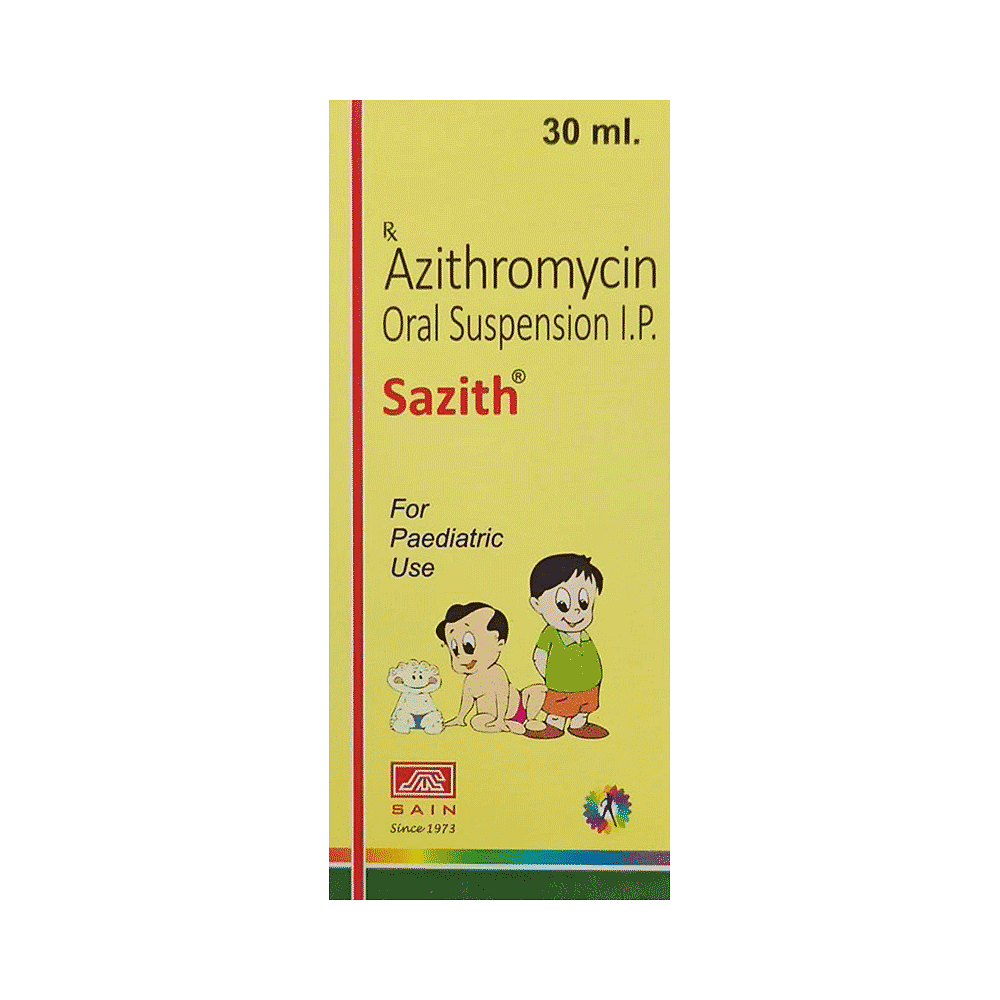
Azital Suspension
Manufacturer
Jarson Pharmaceuticals
Salt Composition
Azithromycin (100mg)
Key Information
Short Description
Azital Suspension is an antibiotic medication used to treat a wide range of bacterial infections in children.
Dosage Form
Suspension
Introduction
Azital Suspension is an antibiotic medication commonly given to children for the treatment of bacterial infections targeting the ear, eyes, nose, throat, lungs, skin, and gastrointestinal tract. It is essential to complete the entire course of this medicine to avoid the bacteria multiplying again or causing another infection.
Directions for Use
Give Azital Suspension with food to avoid an upset stomach. Encourage your child to drink plenty of water in case diarrhea develops as a side effect.
How it works
Azital Suspension is an antibiotic that works by interfering with the synthesis of essential proteins required by bacteria to perform important functions. This stops the infection-causing bacteria from growing further and prevents the infection from spreading.
Quick Tips
Complete the entire course of this medicine to avoid the bacteria multiplying again or causing another infection Give Azital Suspension with food to avoid an upset stomach Encourage your child to drink plenty of water in case diarrhea develops as a side effect Only give Azital Suspension to your child for their current infection Stop the medicine and contact the doctor immediately if your child develops an itchy rash, facial swelling, and breathing difficulties soon after the intake
Related Medicines

Sazith Suspension

Moazil Suspension

Azamra 100mg Suspension

Azizit 100mg Suspension

Azimo Suspension

Zylid Suspension

Azel Suspension

Orizee 100mg Suspension

Azithrot Suspension

Azrocin Suspension
Frequently asked questions
What if I accidentally give my child too much Azital Suspension?
Giving an extra dose of Azital Suspension by mistake is unlikely to cause harm, but speak to your doctor immediately if you think your child has taken too much. An overdose may lead to unwanted side effects or worsen their condition.
Are there any serious potential side effects of taking Azital Suspension?
Some serious side effects associated with Azital Suspension include persistent vomiting, kidney damage, allergic reactions, diarrhea, and severe gastrointestinal infections. Seek help from your child's doctor if you encounter these issues.
Can I give other medications to my child while they are on Azital Suspension treatment?
Azital Suspension may interact with other substances or medicines. Inform your doctor about any other medications your child is taking before starting Azital Suspension, and check with their doctor before giving any additional medicine.
Can my child get vaccinated while on Azital Suspension treatment?
Antibiotics like Azital Suspension generally don't interfere with vaccines or cause a bad reaction. However, it's best to delay vaccinations until your child has recovered from the illness being treated by Azital Suspension. Once they feel better, you can proceed with vaccinations.
What lab tests should my child undergo while taking Azital Suspension for an extended period?
Your doctor may recommend regular kidney function tests and liver function tests to monitor their condition during long-term treatment with Azital Suspension.
Can Azital Suspension affect my child's digestion?
Taking Azital Suspension can lead to stomach upset in children, as it kills both good and bad bacteria. If your child experiences diarrhea while on the medication, don't stop the course without consulting their doctor first.
Why is Azital Suspension given for 3 days?
The treatment duration depends on the type of infection being treated and your child's age. In some cases, a single dose of 500 mg may be given for 3 days, while in others, it might be prescribed as 500 mg once followed by 250 mg from day 2 to day 5, or even a single 1-gram dose in certain situations. It is essential to follow the specific regimen advised by your child's doctor.
What should I avoid while my child is taking Azital Suspension?
Generally, it is recommended that patients on Azital Suspension should avoid taking any antacids with this medication, as they can affect its overall effectiveness, and also be cautious of increased risk of sunburn when exposed to sunlight or tanning beds.
Is Azital Suspension a strong antibiotic?
Azital Suspension is an effective antibiotic used for treating many bacterial infections. Its longer half-life allows it to stay in the body for a long time, making it suitable for once-a-day dosing for a short period, compared to other antibiotics that have shorter half-lives and are often given multiple times a day.
Can Azital Suspension cause a yeast infection?
Some people may develop thrush (a fungal or yeast infection) after taking Azital Suspension. This is because the antibiotic can kill off normal or 'good bacteria' in the intestine that help prevent thrush. If your child experiences soreness, vaginal itching, discharge, or develops white patches on their mouth or tongue while taking Azital Suspension or shortly after stopping it, inform your doctor.


